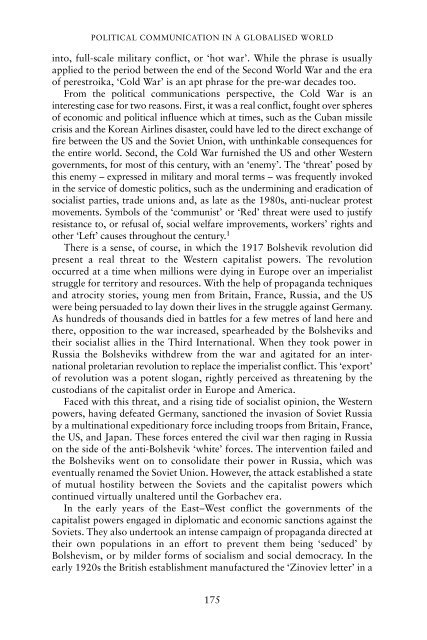20130412164339753295_book_an-introduction-to-political-communication
20130412164339753295_book_an-introduction-to-political-communication
20130412164339753295_book_an-introduction-to-political-communication
Create successful ePaper yourself
Turn your PDF publications into a flip-book with our unique Google optimized e-Paper software.
POLITICAL COMMUNICATION IN A GLOBALISED WORLD<br />
in<strong>to</strong>, full-scale military conflict, or ‘hot war’. While the phrase is usually<br />
applied <strong>to</strong> the period between the end of the Second World War <strong>an</strong>d the era<br />
of perestroika, ‘Cold War’ is <strong>an</strong> apt phrase for the pre-war decades <strong>to</strong>o.<br />
From the <strong>political</strong> <strong>communication</strong>s perspective, the Cold War is <strong>an</strong><br />
interesting case for two reasons. First, it was a real conflict, fought over spheres<br />
of economic <strong>an</strong>d <strong>political</strong> influence which at times, such as the Cub<strong>an</strong> missile<br />
crisis <strong>an</strong>d the Kore<strong>an</strong> Airlines disaster, could have led <strong>to</strong> the direct exch<strong>an</strong>ge of<br />
fire between the US <strong>an</strong>d the Soviet Union, with unthinkable consequences for<br />
the entire world. Second, the Cold War furnished the US <strong>an</strong>d other Western<br />
governments, for most of this century, with <strong>an</strong> ‘enemy’. The ‘threat’ posed by<br />
this enemy – expressed in military <strong>an</strong>d moral terms – was frequently invoked<br />
in the service of domestic politics, such as the undermining <strong>an</strong>d eradication of<br />
socialist parties, trade unions <strong>an</strong>d, as late as the 1980s, <strong>an</strong>ti-nuclear protest<br />
movements. Symbols of the ‘communist’ or ‘Red’ threat were used <strong>to</strong> justify<br />
resist<strong>an</strong>ce <strong>to</strong>, or refusal of, social welfare improvements, workers’ rights <strong>an</strong>d<br />
other ‘Left’ causes throughout the century. 1<br />
There is a sense, of course, in which the 1917 Bolshevik revolution did<br />
present a real threat <strong>to</strong> the Western capitalist powers. The revolution<br />
occurred at a time when millions were dying in Europe over <strong>an</strong> imperialist<br />
struggle for terri<strong>to</strong>ry <strong>an</strong>d resources. With the help of propag<strong>an</strong>da techniques<br />
<strong>an</strong>d atrocity s<strong>to</strong>ries, young men from Britain, Fr<strong>an</strong>ce, Russia, <strong>an</strong>d the US<br />
were being persuaded <strong>to</strong> lay down their lives in the struggle against Germ<strong>an</strong>y.<br />
As hundreds of thous<strong>an</strong>ds died in battles for a few metres of l<strong>an</strong>d here <strong>an</strong>d<br />
there, opposition <strong>to</strong> the war increased, spearheaded by the Bolsheviks <strong>an</strong>d<br />
their socialist allies in the Third International. When they <strong>to</strong>ok power in<br />
Russia the Bolsheviks withdrew from the war <strong>an</strong>d agitated for <strong>an</strong> international<br />
proletari<strong>an</strong> revolution <strong>to</strong> replace the imperialist conflict. This ‘export’<br />
of revolution was a potent slog<strong>an</strong>, rightly perceived as threatening by the<br />
cus<strong>to</strong>di<strong>an</strong>s of the capitalist order in Europe <strong>an</strong>d America.<br />
Faced with this threat, <strong>an</strong>d a rising tide of socialist opinion, the Western<br />
powers, having defeated Germ<strong>an</strong>y, s<strong>an</strong>ctioned the invasion of Soviet Russia<br />
by a multinational expeditionary force including troops from Britain, Fr<strong>an</strong>ce,<br />
the US, <strong>an</strong>d Jap<strong>an</strong>. These forces entered the civil war then raging in Russia<br />
on the side of the <strong>an</strong>ti-Bolshevik ‘white’ forces. The intervention failed <strong>an</strong>d<br />
the Bolsheviks went on <strong>to</strong> consolidate their power in Russia, which was<br />
eventually renamed the Soviet Union. However, the attack established a state<br />
of mutual hostility between the Soviets <strong>an</strong>d the capitalist powers which<br />
continued virtually unaltered until the Gorbachev era.<br />
In the early years of the East–West conflict the governments of the<br />
capitalist powers engaged in diplomatic <strong>an</strong>d economic s<strong>an</strong>ctions against the<br />
Soviets. They also under<strong>to</strong>ok <strong>an</strong> intense campaign of propag<strong>an</strong>da directed at<br />
their own populations in <strong>an</strong> effort <strong>to</strong> prevent them being ‘seduced’ by<br />
Bolshevism, or by milder forms of socialism <strong>an</strong>d social democracy. In the<br />
early 1920s the British establishment m<strong>an</strong>ufactured the ‘Zinoviev letter’ in a<br />
175
















